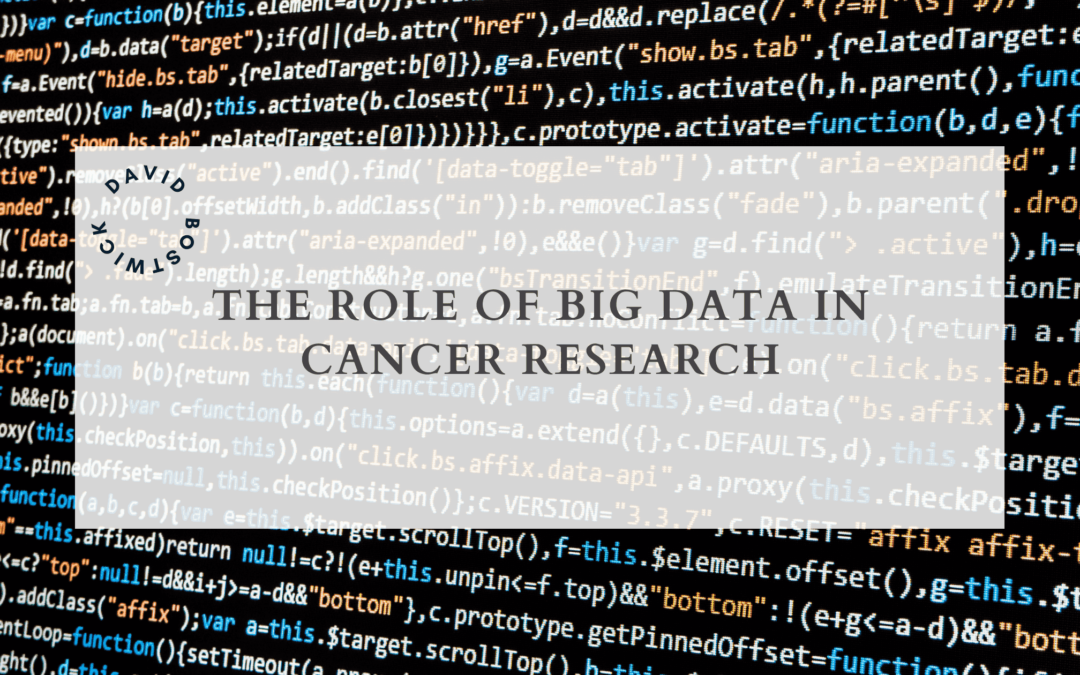Big data is transforming the landscape of cancer research, offering unprecedented opportunities to advance our understanding of the disease and develop more effective treatments. By analyzing large datasets that include genomic information, clinical outcomes, and patient demographics, researchers can uncover new insights into cancer biology and identify novel therapeutic targets. This blog explores the role of big data in cancer research and how it is driving innovation in the fight against cancer.
Understanding Big Data in Cancer Research
Big data in cancer research refers to the vast and complex datasets generated from various sources, including genomic sequencing, electronic health records (EHRs), clinical trials, and epidemiological studies. These datasets are often too large and complex to be analyzed using traditional methods, but with the advent of advanced computational tools and machine learning algorithms, researchers can now extract meaningful insights from this data.
The integration of big data into cancer research allows for a more comprehensive understanding of the disease, taking into account the genetic, molecular, and environmental factors that contribute to cancer development and progression. By analyzing these factors in large populations, researchers can identify patterns and correlations that may not be apparent in smaller studies.
Advancing Precision Medicine
One of the most significant contributions of big data to cancer research is its role in advancing precision medicine. By analyzing genomic data from thousands of cancer patients, researchers can identify specific genetic mutations and molecular signatures associated with different cancer subtypes. This information is crucial for developing targeted therapies that are tailored to the unique characteristics of a patient’s tumor.
Big data also enables researchers to identify biomarkers that predict how a patient will respond to certain treatments. For example, by analyzing data from clinical trials, researchers can determine which patients are most likely to benefit from immunotherapy or targeted therapies, leading to more personalized and effective treatment strategies.
Accelerating Drug Discovery and Development
Big data is also playing a critical role in accelerating the drug discovery and development process. Traditional drug development is a time-consuming and expensive process, often taking years or even decades to bring a new therapy to market. However, by leveraging big data, researchers can identify potential drug targets more quickly and efficiently.
For instance, by analyzing large datasets of genetic and molecular information, researchers can identify proteins or pathways that are frequently altered in cancer cells. These findings can then be used to develop new drugs that specifically target these alterations. Additionally, big data can help identify existing drugs that may be repurposed for cancer treatment, potentially speeding up the development process.
Enhancing Cancer Epidemiology and Public Health
Big data is also transforming the field of cancer epidemiology and public health. By analyzing data from large populations, researchers can identify trends in cancer incidence, prevalence, and mortality. This information is crucial for understanding the impact of cancer on different populations and for developing strategies to reduce cancer risk.
For example, big data can be used to identify environmental and lifestyle factors that contribute to cancer, such as smoking, diet, and exposure to carcinogens. By understanding these factors, public health officials can develop targeted interventions to reduce cancer risk and improve population health.
Challenges and Ethical Considerations
While big data offers significant opportunities for cancer research, it also presents challenges and ethical considerations. One of the primary challenges is the integration and standardization of data from different sources. Ensuring that data is accurate, complete, and comparable across studies is essential for drawing meaningful conclusions.
Additionally, the use of big data in cancer research raises ethical concerns related to patient privacy and data security. Protecting the confidentiality of patient information is paramount, and researchers must ensure that data is handled in a way that respects patient autonomy and complies with legal and ethical standards.
Big data is revolutionizing cancer research, offering new insights into the disease and driving innovation in treatment and prevention. By enabling a more comprehensive understanding of cancer biology, advancing precision medicine, and accelerating drug discovery, big data is helping researchers and clinicians develop more effective and personalized approaches to cancer care. As technology continues to evolve, the role of big data in cancer research will only expand, bringing us closer to a future where cancer is a more manageable and treatable disease.

